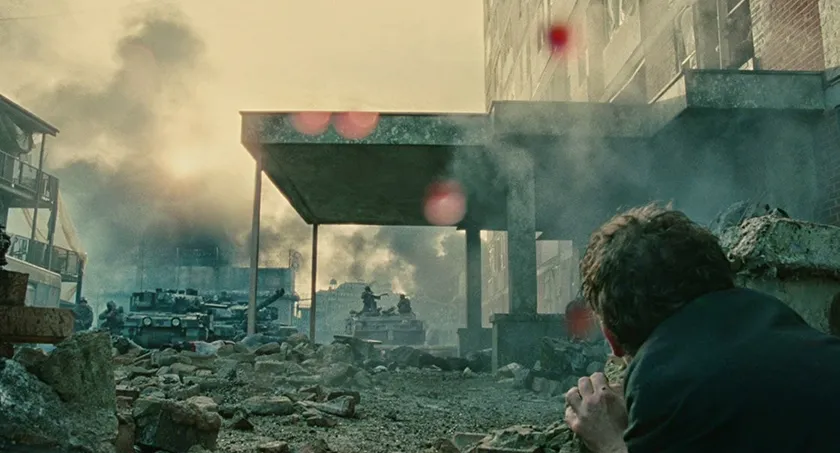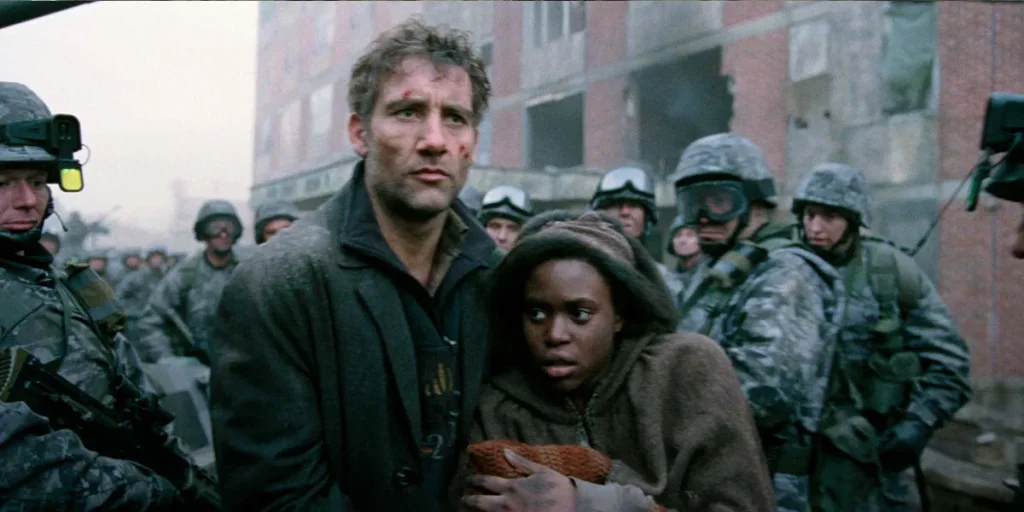Children of Men is a terrifying, exhilarating, and sickening portrait of the darkest corners of humanity, but one that inspires hope all the same.
Director: Alfonso Cuarón
Genre: Thriller, Sci-Fi, Dystopian, Psychological Drama
Run Time: 109′
Rated: R
Release Date: December 25, 2006
Where to Watch: Digital & VOD
Children of Men opens with a news report that, upon the film’s release, must have felt eerily dystopian. Riots on the streets of London, immigrants rounded up on Britain’s shores, and resistance to governmental failings labeled as terrorism. From these chillingly prophetic news clippings it becomes immediately clear, even more so today than two decades ago, that Children of Men isn’t trying to make its dystopian setting realistic – but rather to present the dystopia of reality.
Alfonso Cuarón’s apocalyptic thriller takes place in a near-distant future where humanity has grown inexplicably unable to reproduce; the world’s youngest children are now approaching adulthood, and no woman has known pregnancy for at least eighteen years. But while the rest of the world seems to have fallen into anarchy, Britain has maintained its strength by adapting itself into a totalitarian state, where foreigners are shot dead on the streets and their accomplices shown no mercy.
Enter Theo Faron (Clive Owen), a cynical government bureaucrat who manages to stumble head-first into a rebellious conspiracy to house a young immigrant and offer her safe passage off the British shores. The catch? She’s pregnant with the first baby humanity has known for almost two decades. With the future of humanity relying on her safety, Theo sets out on a life-affirming quest to deliver young Kee (Clare-Hope Ashitey) to the Human Project, a blacklisted organization operating in the Azores to find a cure to the world’s infertility.
What’s most impactful about Children of Men isn’t the dynamic, groundbreaking camerawork or the deeply intimate and emotional performances (though they can’t be overlooked), but rather the way Cuarón’s story effortlessly balances the line between an unfathomably bleak, often nihilistic concept, and the soulful, comforting message that lies at its core. It’s hard to see how a story about complete societal collapse, with such a depressing dissection of the falsehood of British patriotism, could ever instill the audience with hope and purpose for the future – but that’s exactly what Children of Men accomplishes.

There are so many moments in Cuarón’s screenplay that speak to something fundamental about the human condition: a desire to see the world survive longer than ourselves. The way these characters come together to protect complete strangers, securing the existence of a generation they’ll never live to see, is very profound and distinctly ahead of its time. You could discuss for hours how accurately and frighteningly Children of Men managed to predict the ongoing rise of populism, extremism, and authoritarianism in Western culture, but the film’s commentary on love and sacrifice is equally universal. Kee’s baby is more than a plot device: she’s a fierce reminder that when the world comes crashing down around us, compassion is the last thing we’ve got.
But a good story – a perfect story, even – doesn’t necessarily make a good film. Thankfully, Children of Men doesn’t only succeed on a narrative level, but its stunning visuals and fluid camerawork shine just as bright. Alfonso Cuarón has an unrelenting command over this story, constantly placing his camera in the middle of the action and tracking his characters for long periods of time to maintain that immersive, naturalistic aesthetic that makes Children of Men so distinct.
There are so many unforgettable set pieces in this film, whether that’s the notorious one-shot car sequence, Theo’s escape from the safe house, or Kee carrying her baby through the warzone at Bexhill. Cuarón makes everything feel so effortlessly tangible and real, and the richly layered performances from the entire cast manage to elevate these moments even further. Clive Owen and Clare-Hope Ashitey are particularly impressive in the movie’s closing moments, which perfectly summarize and distill all of Children of Men’s most potent themes into such a simple conversation.
Ultimately, Children of Men is not just Alfonso Cuarón’s best film to date, but one of the most formative stories of the 21st century. From its biting social commentary to its revelatory visuals and formal experiments, the movie perfectly manages to suck the audience into a landscape that feels both very distinct from reality while integrating and emphasizing the most disturbing elements of the world around us. Children of Men can certainly feel like a hopeless, demoralizing story at times, but it also prompts us to remember that life, flawed as it may be, is the most precious gift we have.
Children of Men: Movie Plot & Recap
Synopsis:
In a not-so-distant future where humanity has grown inexplicably infertile and Great Britain has transformed into a totalitarian state, Theo Faron undertakes a dangerous mission to bring hope back to the human race.
Pros:
- Exceptionally compelling performances, most notably from Clive Owen and Clare-Hope Ashitey.
- Dynamic camerawork and immersive set pieces that place the audience in the middle of the action.
- A poignant, timeless message about the miracle of life and the value of compassion.
Cons:
- Unsteady pacing throughout the second act.
Children of Men is now available to watch on digital and on demand.
Loud and Clear Reviews has an affiliate partnership with Apple, so we receive a share of the revenue from your purchase or streaming of the films when you click on some of the links on this page. This won’t affect how much you pay for them and helps us keep the site free for everyone.

